ADHD doesn’t just make life messy; it can feel like your brain is a browser with 74 tabs open—all at once—most of them playing music. That’s why, for some, finding the right medication isn’t just helpful, it can be life-changing. People talk a lot about stimulants like Adderall and Ritalin, but they don’t work for everyone. That’s where Strattera comes in: a non-stimulant option that’s quietly helped millions focus better, control impulses, and actually finish breakfast before rushing out the door.
Understanding Strattera: How It Works and Who It's For
Strattera isn’t just another ADHD pill. Its scientific name is atomoxetine, and it landed on the U.S. market in 2002. What really sets it apart is that it’s not a controlled substance, doesn’t ramp up dopamine like amphetamines, and has a different risk profile. Strattera is approved for children over 6, teens, and adults—so it covers a big age range and is often the go-to for folks who just can't handle or tolerate stimulants.
Where Adderall and Vyvanse jack up both dopamine and norepinephrine, Strattera only boosts norepinephrine. This neurotransmitter helps regulate attention, impulse control, and even mood. That means Strattera doesn’t usually give you the ‘rush’ that stimulants can, but for lots of people, that’s a huge plus. No peaks and crashes or feeling jittery—just a slow rise over weeks as the medication builds up.
So, who is Strattera really for? Here’s who tends to benefit most:
- People who can’t take stimulants because of anxiety, tics, or heart problems.
- Those with a history of substance abuse who need a non-addictive option.
- Anyone who hasn’t gotten the right results from stimulant meds, or hates the side effects, like appetite loss or insomnia.
- Kids, teens, and adults who need an all-day option that doesn’t disrupt sleep as much or wear off suddenly during homework time.
What’s cool is Strattera doesn’t have the same risk of abuse that surrounds traditional stimulants. It’s also not banned in sports (with some exceptions in professional leagues; check your sport’s rules). Even more, its half-life is long, so you can take it once a day—usually in the morning, with or without food.
Research out of Massachusetts General Hospital (2023) showed that Strattera helps about 60% of kids and teens with ADHD see solid improvements in attention and hyperactivity, especially when given at optimal doses. It’s not an instant fix, though. Most users see changes after two to six weeks.
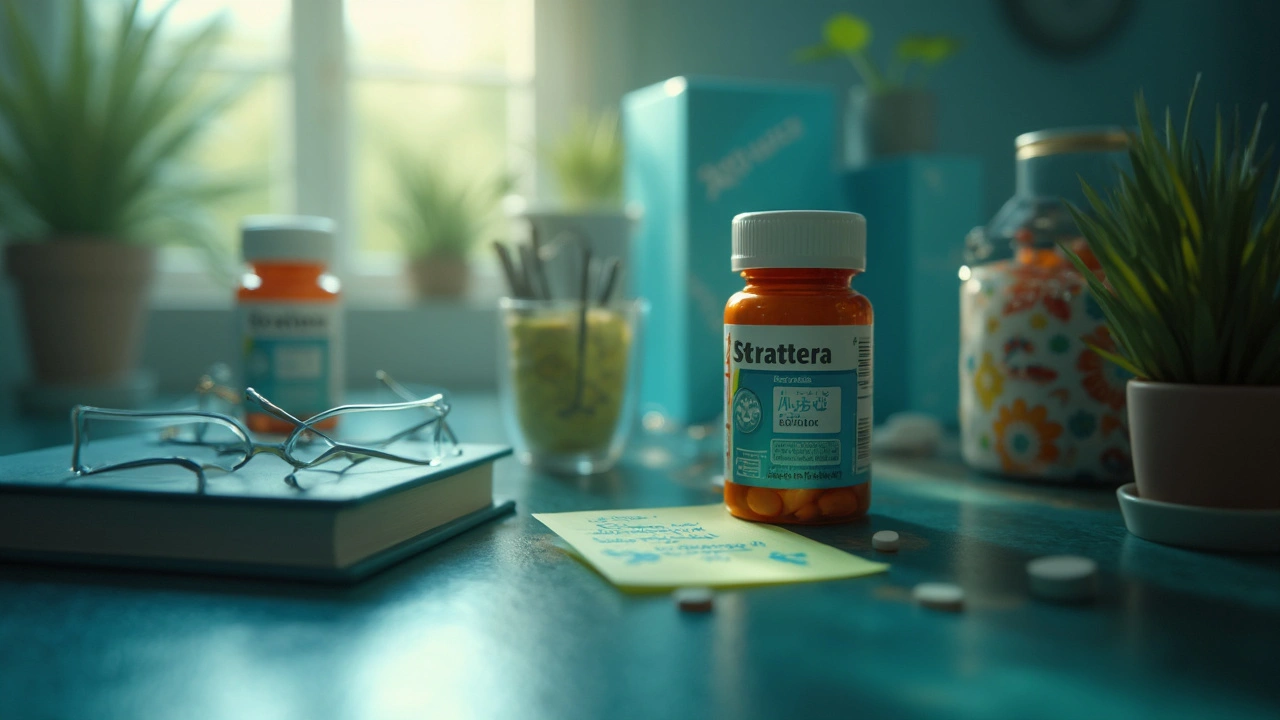
Strattera’s Side Effects, Success Stories, and What to Expect
Starting a new medication can make anyone sweat. The first thing you’ll notice with Strattera are the possible side effects—which, rest assured, are usually less intense than the roller-coaster ride some folks get with stimulants. The most common Strattera side effects include:
- Mild stomach upset or nausea, mainly in the first week or two.
- A mild headache (grabbing a coffee, drinking more water, or taking it with food can help).
- Some people notice drowsiness or even a tiny mood dip early on, especially those sensitive to meds.
- Decreased appetite (not as common or strong as with Adderall).
- Sexual side effects for a few adults, like decreased libido.
- Rare but possible: mood swings, trouble urinating, or increases in blood pressure.
Most side effects let up within a month. One insider tip: start low and go slow. If your doctor nudges your dose up in baby steps, your body usually adapts without much fuss.
People love sharing their before-and-after stories—you'll find thousands on Reddit, TikTok, and in podcasts. Folks who do well on Strattera often say their brains are quieter—not silent, but less scattered. Parents sometimes report their kids finish chores without half a dozen reminders. Some adults say it’s easier to sit through meetings or finally wrap up emails instead of leaving them in drafts for weeks.
It’s not all roses, though. Strattera doesn’t work for everyone. A subset of users report little change, or they find side effects aren't worth the benefit. In a 2024 patient survey by the ADHD Institute, around one-third of people who tried strattera switched back to stimulants or added another treatment like therapy or lifestyle changes.
| Aspect | Strattera | Typical Stimulants |
|---|---|---|
| Class | Non-stimulant, SNRI | Stimulant (amphetamine/methylphenidate) |
| Common side effects | Nausea, sleepiness | Appetite loss, insomnia, jitteriness |
| Abuse risk | Very low | Moderate to high |
| How fast it works | 2-6 weeks | 1-2 hours |
| Who it’s for | Anxiety, substance abuse risk, sleep issues | Most people with ADHD |
| Daily dosing | 1-2x | 1-3x |
Pro tip: If Strattera’s bump in side effects feels too strong, talk to your provider about splitting the dose (morning and evening). Sip fluids and have a light snack before taking it, especially early on.

Making Strattera Work: Real-World Tips, Monitoring, and Combining Approaches
Getting the best out of Strattera takes more than just swallowing a capsule and hoping for the best. For some, it helps to keep notes on symptoms, focus, mood, sleep habits, and even appetite. Tracking your personal ‘before and after’ makes it easier to spot improvements (or issues) you might otherwise miss when you’re caught up in daily life.
Blood pressure and heart rate checks are a good call, just to make sure the medication isn’t doing anything sneaky underneath the surface. Your doctor will usually want to see you after a few weeks, then every few months. If you notice a big dip in energy, sadness, or mood swings, don’t keep it to yourself—tell your provider, who can tweak your dose or timing. If you have liver problems, make sure your doctor knows, since Strattera is metabolized by the liver.
Strattera is rarely the only tool in the toolbox. Lots of people combine it with:
- Cognitive behavioral therapy (CBT) sessions—especially helpful for tackling procrastination and time management.
- Lifestyle shifts like cutting out late-day caffeine, using phone reminders, or keeping a physical planner nearby for checklists.
- Mindfulness apps and sensory breaks, which help split up long study stretches or workblocks.
- Adding a small dose of another med at certain times (known as augmentation), if Strattera alone isn’t quite enough.
Here in Seattle, it’s not uncommon to see folks meet up for "body doubling" study sessions at local coffee shops—two people work silently side-by-side, which helps each person stay on track, especially for those whose medication only does half the trick. Strattera can also work in people with both ADHD and anxiety, which is a bonus because stimulants sometimes crank up anxiety instead.
One thing that surprises many is the difference Strattera can make for sleep. Where some ADHD meds cause restless nights, Strattera can actually settle things down—one sleep study from 2023 out of the University of Washington hinted that about 40% of patients reported better sleep within three months of starting the medication, especially those who avoided taking it at night. Still, don’t expect miracles: creativity, motivation, and memory might still need their own tunes, rituals, or digital reminders.
If you’re thinking about Strattera, don’t get discouraged if you don’t feel a shift right away. It’s the marathon, not the sprint, of ADHD meds. Give it a real shot, track what’s changing, and be open about the journey with your doctor and trusted friends or family. And remember, everyone’s brain is wired a bit differently, so don’t take someone else’s outcome as a promise or a warning. For many, Strattera isn’t just another pill—it’s a ticket to a quieter, more focused mind in a world that never stops buzzing.


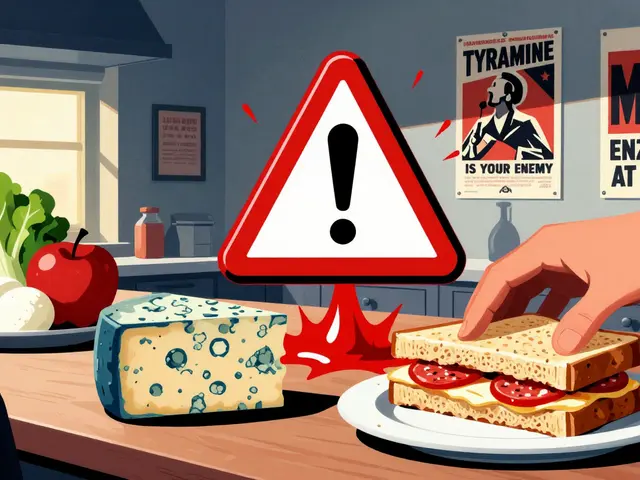
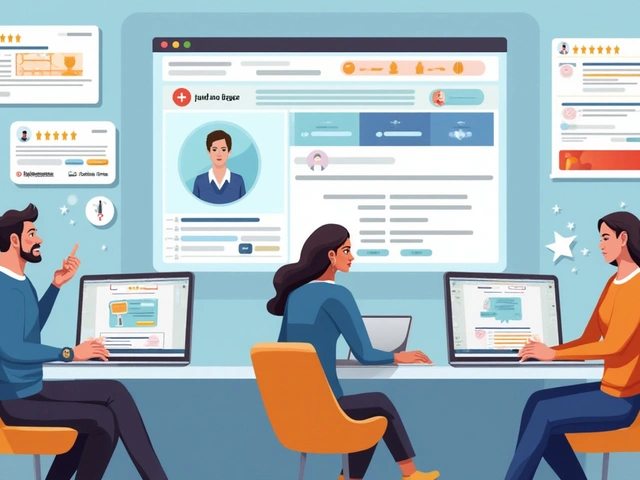
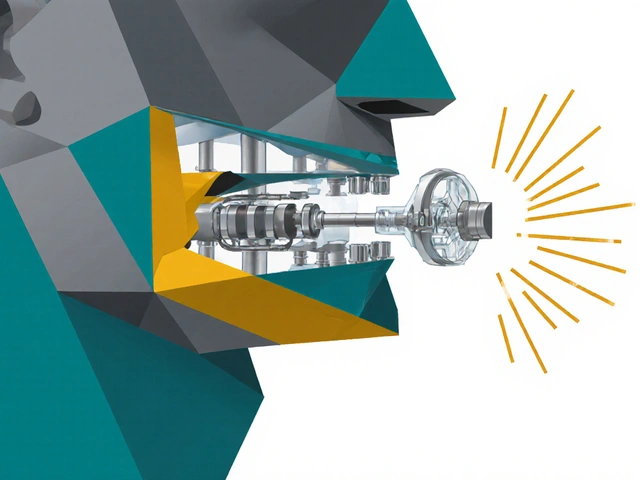
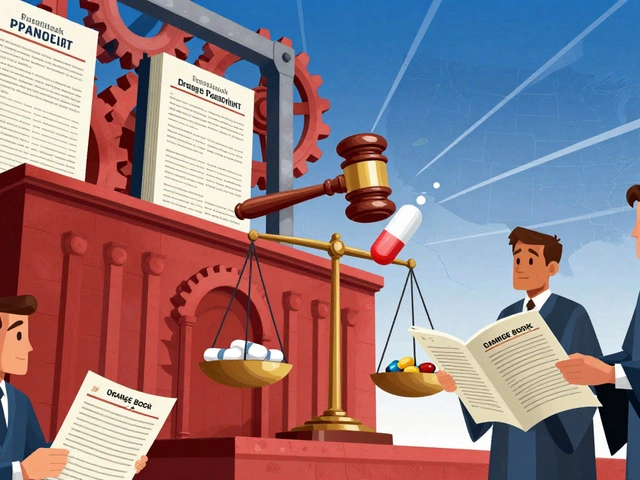
Strattera is pretty interesting as a non-stimulant option for ADHD. I feel like it’s cool to have alternatives to the traditional stimulant meds bc not everyone reacts well to those. The way Strattera works on norepinephrine rather than dopamine changes the whole game for some folks. I remember reading that it's often preferred for people who might have anxiety alongside ADHD, which stimulants can sometimes worsen.
Also, the side effects don’t always hit as hard compared to stimulants, but they are there so you have to be careful. The article mentioning real-life stories helps put a human touch on it too, which is refreshing. Treatment with ADHD is so personal and subjective; what works for one might not for another.
Overall, happy to see discussions like this shedding light on newer options. Anyone here have experience with Strattera they wanna share?
July 17Dhanu Sharma